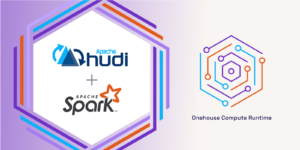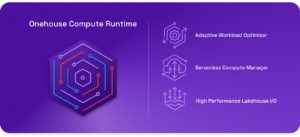(Florentin Catargiu/Shutterstock)
Organizations investing in knowledge lakehouses in 2025 might wish to take a look at a brand new providing launched by Onehouse this week. The corporate based by the creator of the Apache Hudi desk format launched Onehouse Compute Runtime (OCR), which it says permits prospects to handle and optimize knowledge lakehouse workloads throughout a number of cloud platforms, question engines, and codecs. of open tables.
We’re in the course of A growth within the building of information lakehouses in the mean time, largely because of the business merging across the Apache iceberg desk format in mid-2024, which lowered the probabilities that the client might select the “mistaken” format, thus leaving their knowledge stranded. The rise of Iceberg would seem to place tabletop codecs in competitors, together with Apache Hudi and Information bricks Delta Lake, within the background. However Hudi-backer folks a home They see ample alternatives and don’t take adjustments idly.
Whereas the Hudi-Iceberg comparability is not precisely apples to apples (learn this story (to find out how Hudi was initially designed to resolve the quick knowledge downside on Uber’s Hadoop cluster), Onehouse is adapting to the fact that Iceberg is positioned to be the dominant desk format sooner or later. A technique to do that is by beginning OCR.
OCR provides prospects the power to handle their lake home environments throughout a number of cloud platforms (Databricks, Snowflake, AWS, Google cloud) that use a wide range of question engines (Spark, Redshift, BigQuery, Snowflake) on knowledge saved in a number of desk codecs (Iceberg, Delta Lake, and Hudi). OCR doesn’t deal with the execution of SQL workloads (or different computing hundreds). Reasonably, it focuses on automating a few of the much less glamorous however obligatory upkeep jobs that lake homes require.
Onehouse workers Kyle Weller and Rajesh Mahindra clarify the rising state of affairs. in a weblog submit this week:
“Fundamental learn/write assist is a commendable begin to establishing independence, however new friction factors have emerged that problem storage changing into interoperable and common once more: knowledge catalogs, desk upkeep, and workload optimizations.” . Nearly all distributors that assist OTF (Open Desk Format) now additionally provide their very own catalog and upkeep, which frequently restricts which instruments can learn/write to the tables. To make sure that knowledge management stays firmly within the fingers of customers, the business wants not solely decentralized storage but additionally a rigorously designed decentralized computing platform that may carry out desk upkeep and optimize typical workloads universally throughout these totally different suppliers and cloud knowledge shops.”
Onehouse OCR goals to be that decentralized computing platform. The providing, which Onehouse launched on Thursday, January 16, mechanically spins up wanted compute sources throughout a number of cloud platforms utilizing serverless computing strategies in prospects’ personal digital non-public cloud (VPC) environments.
OCR’s Spark-based serverless compute supervisor allows elastic scaling of Lakehouse upkeep workloads equivalent to knowledge ingestion, desk optimization, and ETL operations. This ends in a 2- to 30-fold efficiency achieve with 20% to 80% value financial savings, the corporate claims. OCR helps a number of codecs through the use of Apache XTable (incubation), the open supply providing that gives learn and write interoperability between Hudi, Delta and Iceberg desk codecs. Onehouse donated XTable to Apache.
OCR makes use of vectorized column fusion for quick writes, parallel pipelined execution to maximise CPU effectivity, and optimized storage entry to scale back community requests in comparison with commonplace open supply Parquet readers, the corporate says.
OCR’s objective is to provide prospects all of the instruments they should benefit from the expansion of lake homes and the openness of tabletop codecs, in keeping with Vinoth Chandar, creator of Hudi and founder and CEO of Onehouse.
“Whereas open desk codecs have emerged as a way to open knowledge throughout a number of engines, there’s a robust want for a high-performance computing platform that may rework and optimize knowledge throughout such engines,” says Chandar, a BigDATAwire 2024 Particular person to comply with, in a press launch. “With OCR, we offer all of the IT infrastructure and software program wanted to run knowledge lakehouse workloads effectively. The OCR capabilities are based mostly on years of expertise powering the world’s largest knowledge lakes utilizing Apache Hudi, extensively regarded for its excessive efficiency throughout the business. The runtime optimizes all typical knowledge lake operations centrally as soon as throughout all engines, lowering redundant compute prices and blocking factors.”
One of many early adopters of OCR is the digital advertising and marketing firm. Driver. “Our Onehouse knowledge lake has allowed us to satisfy the calls for of speedy development whereas dramatically simplifying our knowledge structure,” stated Emil Emilov, principal software program engineer at Conductor. “With automated scaling and sources that adapt to our workloads, Onehouse helps us dedicate our groups to growing the differentiators of our core platform as a substitute of holding the information stack regularly optimized.”
Onehouse will host a webinar on Thursday, January 23 at 10am PT to supply extra particulars on OCR. You possibly can register for the webinar right here. You can even learn Onehouse’s weblog on OCR. right here.
Associated articles:
Why Information Lakehouses Are Poised for Huge Development in 2025
How Apache Iceberg Gained the Open Desk Wars
Apache Hudi is just not what you assume it’s

